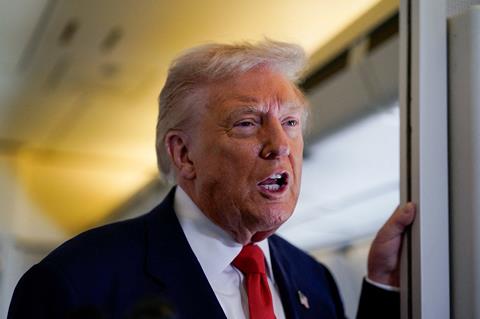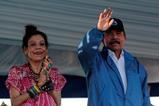For decades organisations such as Christian Solidarity Worldwide have been sounding the alarm about the targeting of Christians in Nigeria. Ellis Heasley is glad the US has finally woken up to horrors being perpetuated - even if Trump’s threats of military action were typically bombastic

On 31 October, the US president, Donald Trump, announced on his Truth Social platform that “Christianity is facing an existential threat in Nigeria”. As a result, he was designating the nation a Country of Particular Concern (CPC).
In typically Trumpian fashion, this marked a break from usual practice - CPC designation is normally delegated to the secretary of state and announced in November or December. Nonetheless, the decision is welcome, and long overdue.
Under the US International Religious Freedom Act 1998, countries are designated CPCs when their governments are deemed to engage in or tolerate “systematic, ongoing, and egregious violations of religious freedom”.
This has been the case in Nigeria for decades.
Since 2009, tens of thousands of Nigerian citizens have been killed, maimed, abducted and forcibly displaced by terrorist organisations, many of whom are driven by religious extremism or use religion and/or ethnicity as rallying points for recruitment.
The most well-known is the notorious Boko Haram, which - along with offshoots including the Islamic State West Africa Province (ISWAP) and al Qaeda affiliate Ansaru - has emptied entire communities in the north of the country. They initially focussed on Christian areas, then widened their target to Muslim communities they deemed insufficiently loyal or pious.
A long history of violence
Particularly infamous is a group often referred to as the Fulani militia – a reflection on the ethnicity of its members, but by no means inclusive of countless peaceful Fulanis spread across West and Central Africa. This group initially targeted communities in the predominantly Christian Plateau State in March 2010, with mass killings spreading exclusively to Christian farming communities in several other central states the following year and increasing exponentially from 2015.
Crucially, insufficient action by successive governments, and alleged complicity by elements in the security forces, has allowed this threat to metastasise. Armed Fulani assailants are now targeting ethnic Hausa Muslim farming communities in the northwest with equal brutality.
The suffering of Christians must not become a tool in culture wars
Meanwhile, the existence of Sharia penal codes in twelve Nigerian states has effectively rendered Islam their state religion, compounding the systematic marginalisation, discrimination and socioeconomic privations non-Muslim communities have been experiencing since the pre-independence era.
In most of these states, the construction of churches is severely restricted, while underage girls from minority faith communities regularly experience abduction, forced conversion and marriage without parental consent at the hands of local men – often with the complicity of traditional leaders and religious institutions.
For these reasons, and more besides, CSW has been calling on the US government to designate Nigeria a CPC for many years. In 2020, Nigeria was added to the list for the first time, only to be removed a year later despite no discernible improvement. It did not even make the secondary Special Watch List, although the US did at least designate Boko Haram and ISWAP “Entities of Particular Concern” in December 2023.
A step in the right direction
President Trump’s announcement could therefore prove significant. It should be regarded by the Nigerian government as an encouragement, or even an incentive, to address grave violations that have persisted in the country for decades – starting with the horrific religion-related violence in the north and centre – as a matter of utmost urgency.
Where Trump’s recent engagement on Nigeria could prove less helpful, however, is in the suggestion he made the day after the CPC announcement that the US could potentially descend on Nigeria “guns-a-blazing” if the killings continue. This posture, which plays well with some in his domestic audience, has also caused consternation that it could detract from the main purpose of a CPC designation.
Insufficient action by successive governments has allowed this threat to metastasise
It is also worth noting that the designation comes after weeks of heightened attention on the violence that occasioned it. This was sparked by comments from US comedian Bill Maher, which many viewed as an effort to distract from the international designation of genocide in Gaza.
The appalling suffering that Christians in central and northern Nigeria have endured for decades is finally receiving the international attention it has long merited. It must not however become a tool in culture wars.
We hope, pray and trust that this time the CPC designation will mark a definitive step towards ending this suffering. For this occur, the US administration must ensure that any action taken advances accountability and assists efforts to combat terrorist violence, rather than obscure, impede or complicate them.






































1 Reader's comment